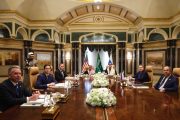
Riots broke out Sunday, June 2 in east Jerusalem, on the site of the Temple Mount, between Jews observing Jerusalem Day and Palestinian Muslims celebrating Ramadan.
June 2 marks the anniversary of the day that Israeli Defense Forces captured the Temple Mount (site of the First and Second Jewish temples) in the 1967 Six-Day War, and is celebrated in Israel as “Jerusalem Day.” Many Jews, mostly those who are more religious, enter the Temple Mount, found in the Old City of Jerusalem, on that day as part of the celebration.
In the past, Israeli police have tried to prevent Jews from entering the area — especially during the Islamic holy month of Ramadan — in an effort to prevent riots by angry Muslims. Last month, police had announced that the entire area would be off-limits to Jews and tourists “for reasons of public safety and public order.” (In addition to the Western Wall, many Christians visit the area, which includes the Church of the Holy Sepulcher — one of two possible sites for the tomb where Jesus was buried before His resurrection.) This order to keep out Jews and Christian tourists during the last few days of Ramadan resulted in some Jewish activists arguing that the policy was discriminatory against Jews, whom they believed had as much right to enter the area as Muslims.
In a change of policy, the police were told by Major General Doron Yedid (commander of the Jerusalem District) to allow the entry of Israeli Jews into the area, and predictably, this resulted in riots. Hundreds of Jewish celebrants were confronted by a like number of Palestinian protesters who demonstrated their displeasure by throwing chairs and other objects at police, who were trying to keep the peace. Police quickly took control of the situation, and the Jewish celebrants continued their commemoration of the taking of the Old City, which includes the Temple Mount.
The Second Jewish Temple was destroyed during the Jewish war against the Roman occupation in A.D. 70, and it is believed that the Muslim “Dome of the Rock” mosque was constructed on that site, on what is now called the Temple Mount.
The site holds additional significance for religious Jews, as they believe it was the same location as where Abraham was told by God to offer up his son Isaac as a sacrifice, before being stopped by God.
In 1947, the United Nations’ “Partition Plan” stipulated that two states be created in Palestine — one Jewish and one Arab. As part of that plan, Jerusalem would become an international city for 10 years, after which time a referendum would be held. In that proposed referendum, the residents of the city of Jerusalem could vote whether to join the Jewish state or the Arab state. Jewish nationalists accepted the plan, but Arab leaders rejected it.
The next year, Israel declared its independence on May 14, 1948, resulting in a war between Israel and many of its Arab neighbors, such as Egypt, Syria, and Jordan. While the Israelis gained more land in the war, they were unable to dislodge the Jordanians from east Jerusalem. In the aftermath of the war, Jewish residents in east Jerusalem were expelled, and about one-half of the Old City’s 58 synagogues were destroyed. Additionally, Jewish cemeteries atop the Mount of Olives, which overlooks the Temple Mount area, were desecrated, and the tombstones were used for paving stones and building materials.
Then, after another war erupted between Israel and some other Arab nations in the region, Israeli forces took east Jerusalem, including the Temple Mount area. They placed the Israeli flag atop the Dome of the Rock, and thousands of Jordanian soldiers surrendered. In an apparent effort to soften Arab resistance to Israeli rule over the Old City and the Temple Mount, Israeli General Moshe Dayan ordered the lowering of the Israeli flag and turned over management of the Temple Mount to a Muslim religious trust.
Tensions have risen in recent years, as many religious Jews have become increasingly insistent that they should be able to reclaim the holy site, with some even expressing a desire to build a third Jewish temple on the site and begin animal sacrifices again. This has, of course, led to push-back from the Muslims, who believe any such Jewish temple would be a “desecration.”
Hopefully, the United States will not be drawn into this conflict.
Photo: AP Images




